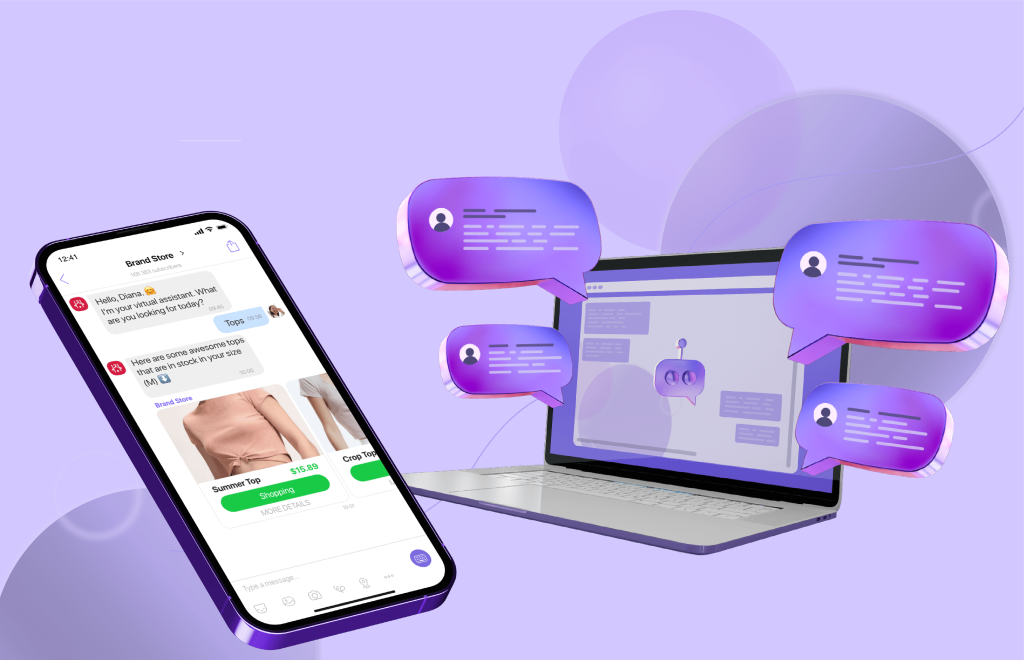Power of Messages: Integrating Viber, Telegram, WhatsApp, and Facebook Messenger into Your Email Marketing Strategy
While email marketing remains a formidable tool, exploring innovative ways to connect with your customers is essential. This article delves into leveraging messaging channels like Viber, Telegram, WhatsApp, and Facebook Messenger to supercharge your email marketing strategy.
When considering Viber, Telegram, WhatsApp, and Facebook Messenger as channels for email marketing for business, evaluating their features, reach, and suitability for your specific goals is essential. Here’s a comparative overview of these messaging apps.
Viber
Viber is a multimedia messaging app that offers text and voice messaging and a wide range of stickers, emoticons, and multimedia-sharing options. It’s recognized for its user-friendly interface and extensive sticker collections. Viber Business Messages enable businesses to engage with customers for promotions, support, and transactions.
Pros:
- Viber is a popular messenger in certain regions, offering access to a specific user base.
- It supports rich media, making it suitable for visually engaging content.
- You can use Viber Business Messages for promotional purposes.
Cons:
- Viber’s user base is smaller than other platforms, limiting your reach.
- It may be less widely used in specific markets or demographics.


Telegram
Telegram is a cloud-based messaging platform that prioritizes security and speed. It’s known for its strong encryption, self-destructing messages, and the ability to create supergroups with many members. Telegram also supports channels for broadcasting messages to a broader audience, making it a favorite among privacy-conscious users and businesses looking for secure communication.
Pros:
- Telegram is known for its security and privacy features, which can build user trust.
- It supports bots and automation, enabling interactive and personalized messaging. Telegram offers robust bot functionality, allowing businesses to automate responses, conduct surveys, and provide interactive experiences. Bots can enhance user engagement, streamline specific customer interactions, and even facilitate transactions, making them valuable in email marketing campaigns.
- Telegram has a global user base and is popular in tech-savvy communities.
- Telegram supports various types of rich media, including images, videos, and files. This versatility allows you to deliver visually appealing and engaging content, which can be more effective than plain text emails.
Cons:
- While it has a significant user base, Telegram may not be as mainstream as WhatsApp or Facebook Messenger.
- Marketing efforts should respect users’ privacy and opt-in preferences.

WhatsApp is one of the world’s most popular messaging apps. It’s known for its end-to-end encryption, ensuring private conversations. WhatsApp Business, a dedicated business version, allows companies to create professional profiles, use automated messaging for customer support, and integrate with CRM systems. It’s trusted by a vast global user base for its reliability and ease of use.
Pros:
- WhatsApp has an enormous user base worldwide, offering a vast reach for businesses.
- It supports rich media, automation, and business profiles for professional communication.
- It’s well-suited for customer support and transactional messages.
Cons:
- WhatsApp has stringent opt-in requirements, and users must consent to receive messages.
- Automation capabilities are more limited compared to some other platforms.

Facebook Messenger
Facebook Messenger is the platform associated with the social media giant Facebook. Messenger offers chatbots for automation, integrated payment options for transactions, and the ability to send rich multimedia content, making it a versatile choice for businesses seeking a wide-reaching and interactive communication channel.
Pros:
- Facebook Messenger boasts a massive user base and is widely used across demographics.
- It supports chatbots, rich media, and integration with Facebook Pages.
- You can leverage Facebook ad campaigns to drive Messenger interactions.
Cons:
- Users expect a high level of personalization and responsiveness, requiring a well-planned strategy.
- Privacy concerns and user opt-in preferences should be carefully considered.

Key Considerations for Choosing a Platform
Ultimately, the choice of platform should align with your audience, goals, and messaging strategy.
- User Base: Consider the demographics and regions where your target audience is most active. Choose a platform that aligns with your audience’s preferences.
- Messaging Capabilities: Evaluate each platform’s features, such as rich media support, automation, and personalization, to determine which aligns best with your marketing goals.
- Opt-In Requirements: Be aware of each platform’s opt-in requirements and ensure that your marketing efforts comply with their policies.
- Privacy and Trust: Platforms like Telegram and WhatsApp are known for their privacy features, which can enhance trust and engagement.
- Integration: Consider how well the platform can integrate with your existing email marketing and CRM tools for a seamless multichannel strategy.
- User Expectations: Each platform has its own user expectations and best practices. Tailor your messaging and approach accordingly.
- Global Reach: Evaluate the platform’s reach and popularity in your target markets, as it may vary by region.
Many businesses find success by using a combination of these messaging apps alongside their email marketing efforts to reach a broader and more engaged audience.
It’s time to explore new horizons in business communication! With Wooxy, you can seamlessly connect with your audience on various messaging platforms beyond the traditional channels. Reach your customers where they’re most engaged.
How to Integrate Viber, Telegram, WhatsApp or Facebook Messenger into Email Marketing Strategy
Integrating messaging apps like Viber, Telegram, WhatsApp, or Facebook Messenger into your email marketing strategy can enhance communication and engage with your audience more effectively. Here’s how to do it:
Opt-In Messaging Subscriptions:
Allow email subscribers to opt-in to receive messages on their preferred messaging apps. Include clear calls to action in your email campaigns, such as “Receive updates on WhatsApp” or “Chat with us on Facebook Messenger.” Make it easy for subscribers to sign up for messaging updates.
Automated Follow-Ups:
After someone subscribes to messaging updates, set up automated follow-up emails to confirm their subscription and provide any necessary instructions. Ensure that the process is seamless and user-friendly.
Personalized Messaging:
Leverage the user data collected from email subscriptions to send personalized messages via messaging apps. Address subscribers by name and tailor your content to their preferences and behaviors.
Cross-Promotion:
Use both email and messaging platforms to cross-promote each other. Include links to your messaging app profiles in your email signatures and mention your email newsletters in your messaging app communications. This can help you grow your audience on both platforms.
Multi-Channel Campaigns:
Develop marketing campaigns that run simultaneously on email and messaging apps. Consistent messaging across these platforms ensures your audience receives a cohesive brand experience and messaging.
Customer Support:
Offer customer support through messaging apps in addition to email. Respond promptly to customer queries and issues, providing a seamless support experience across channels. Let your email subscribers know they can contact you through messaging apps for quick assistance.
Interactive Content:
Messaging apps allow for interactive content like polls, surveys, and quizzes. Encourage your email subscribers to participate in these interactive activities, engaging them further and collecting valuable data for your marketing efforts.
Transactional Updates:
Send transactional updates such as order confirmations, shipping notifications, and purchase receipts through messaging apps. This ensures that important information reaches your customers quickly and efficiently.
Feedback Collection:
Request feedback and reviews through messaging apps, making it easy for customers to provide their opinions. Positive feedback can be encouraged to be shared on social media, boosting your brand’s online presence.
Analytics Integration:
Implement analytics and tracking tools to measure the performance of your messaging app campaigns. Understand user engagement, open rates, click-through rates, and other relevant metrics to refine your strategies.
By integrating messaging apps into your email marketing strategy, you can create a more dynamic, personalized, and multi-channel approach to engage with your audience, ultimately improving customer satisfaction and the effectiveness of your marketing efforts.
As you embark on this exciting journey of integrating messaging apps into your communication strategy, Wooxy is your dedicated partner. Together, we’ll unlock new opportunities, strengthen customer relationships, and take your business to the next level. The future of communication is here, and we’re ready to help you make the most of it.




